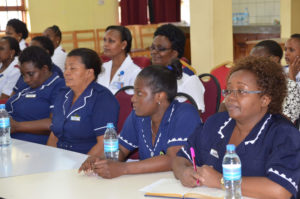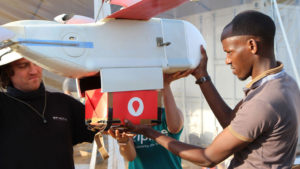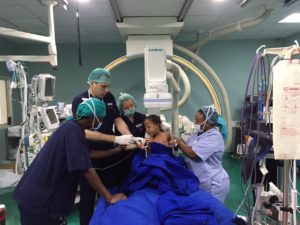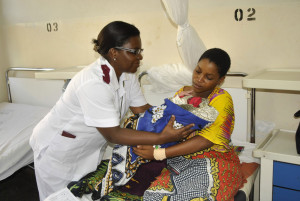by Ben Taylor

Staff at North KCMC Regional Hospital pictured during a visit by Dr Faustine Ndugulile on Nov 22 (uptymes.com)
Disagreements over family planning
President John Magufuli spoke in September against birth control and family planning. In doing so, he reignited a debate that had largely died down after a similar flare-up early in his presidency.
Speaking at a rally in Meatu, the President advised people to ignore those advocating birth control, some of it coming from foreigners, “because it has sinister motives”. “Those going for family planning are lazy, because they are afraid they will not be able to feed their children. They do not want to work hard to feed a large family. And that is why they opt for birth control and end up with one or two children only,” he said. “You people of Meatu keep livestock. You are good farmers. You can then feed your children. Why would you opt for birth control? These are my views, but I do not see any need for birth control in Tanzania,” he said.
He added: “I have travelled to Europe and elsewhere and I have seen the side effects of birth control. In some countries they are now struggling with declining population growth. They have no labour force,” President Magufuli, who was on a tour of Lake Zone regions said.
He urged Tanzanians to keep reproducing because the government was increasing investment in maternal health specifically and the health sector in general. This echoes he previous argument, back in 2016, that his government’s decision to end school fees meant people could give birth to as many children as possible because education was no longer expensive. “Women can now throw away their contraceptives. Education is now free,” President Magufuli had said.
On this more recent occasion, President Magufuli was speaking in the presence of the United Nations Population Fund (UNFPA) representative in Tanzania Jacqueline Mahon and the minister for Health Ummy Mwalimu.
The main opposition party, Chadema, criticised the President’s statements, and pledged to mobilise the public to safeguard family planning initiatives. “We expected the President to be at the forefront of supporting family planning initiatives amid challenges the country faces, especially in planning our highly populated cities and dealing with the job crisis. We want to mobilise the public to safeguard birth control initiatives to better our country and enhance maternal health,” said the party’s Secretary General, Dr Vincent Mashinji.
“All children have the right to education. In facilitating this, family planning education has played a great role in protecting young girls from dropping out of school due to early pregnancies,” he said. The party also called upon all men to always accompany their wives to clinics so that they could get to learn more about family planning as an important thing in the current challenging times.
Less than two weeks later, the government sent a letter to organisations carrying out family planning activities in Tanzania to stop them from broadcasting family-planning adverts in local media.
In the letter, which leaked and then spread rapidly on social media, the permanent secretary for the Ministry of Health, Community Development, Gender, Elderly and Children, Dr Mpoki Ulisubisya, ordered organisations including Family Health International (FHI 360) and the United States Agency for International Development (USAID) to stop airing all content on family planning until it is revised by the government. “The ministry intends to revise the contents of all your ongoing Radio and TV spots for family planning, thus I request you to stop with immediate effect airing and publishing any family planning contents in any media channels until further notice,” reads the letter in part.
Contacted by The Guardian for further clarification, Dr Ulisubisya stated: “We (ministry) want to come up with a standard message for the public on the matter of family planning.”
In a sign of how media and politics are tightly intertwined and indeed highly polarised, reporting of the issue varied greatly between government-owned and privately-owned media outlets. The government-owned Daily News ran the headline “JPM touches on family planning”. This was followed by a statement in the article’s opening line that the President had “emphatically stated that Tanzanian parents have the freedom to have whatever number of children they wish provided they are capable of meeting their basic demands.”
In contrast, The Citizen newspaper focussed on the more contentious elements of the President’s speech, citing his reference to foreigners with sinister motives as well as the link he drew between family planning and laziness.
Amnesty International called on the government to remove laws and other barriers to women and girl’s access to information and services they need to live healthier lives. “The Tanzanian authorities must immediately stop obstructing access to sexual and reproductive health services and end the intimidation of anyone providing information about such services, be they health workers, journalists or activists,” said Seif Magango, Amnesty International’s Deputy Director for East Africa, the Horn and the Great Lakes.
Tanzania has ratified the Maputo Protocol, which states that women have the right to control their fertility and chose any method of contraception, but in practice access to services is limited. A third of women in Tanzania use family planning, according to the UN population fund (UNFPA), with access most limited in rural areas. On average, women give birth to five children.
The United Nations Population Fund, which supports and advocates for improved access to family planning services in many African countries, said its programs were guided by the International Conference on Population and Development agreement, which Tanzania has signed. “A core part of this agreement is to ensure that women have the power and means to access information and services to enable them to decide on the timing, spacing, and number of children,” UNFPA said.
In a fact-sheet published two weeks prior to the President’s rally in Meatu, USAID described their commitment to family planning in Tanzania:
“Family planning is key to Tanzania’s broad-based development, saves lives by helping reduce maternal morbidity and mortality, and increases newborn and child survival rates. USAID began supporting family planning in Tanzania in the late 1980s with a focus on increasing the prevalence rate of modern contraceptives, proving instrumental in building Tanzania’s national program.”
“USAID’s family planning programs are integrated with other health services and non-health programs which contribute to the U.S. Government and Tanzania Government goals of reducing maternal mortality and improving child survival.”
Minister sets ambitious health insurance target: universal coverage by 2020
The government aims to achieve universal coverage of health insurance by 2020, according to the Deputy Minister for Health, Community Development, Gender, Elderly and Children, Dr Faustine Ndugulile. Dr Ndugulile was responding to a question in Parliament.
Dr Ndugulile said NHIF was now serving over 17 million people (32% of the population), with efforts to expand to all areas of the country. “So far NHIF is serving millions of Tanzanians, efforts are underway to ensure that all the people are reached by its service,” he said. He added that the Fund continued to implement its strategy to expand its services and enrol members from both formal and informal sectors, including social service for entrepreneurs and children under 18 years.
Dr Ndugulile had already announced a new government strategy to start providing bundles of health insurance – which he described as being similar to packages of mobile phone airtime and other services – to ensure every Tanzanian could afford the service.
He pointed out that a good number of people in lower income brackets were currently left out of the national health insurance service, thus denying them access to quality health care. “Our aim is to ensure that everyone is served. The government is really committed to seeing that health care is improved…this time the government has also increased the budget for the health sector,” he said.



